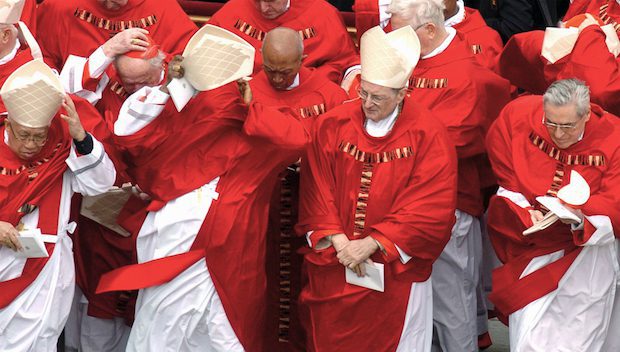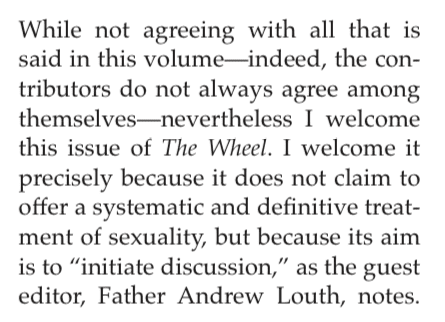French Catholicism: An Autopsy

The French Orthodox writer Jean-Claude Larchet reviews a new (French) book, How Our World Stopped Being Christian: Anatomy Of A Collapse, by historian Guillaume Cuchet. Cuchet specializes in Catholic history. The review is mostly a summary of Cuchet’s analysis, but Larchet ends like this:
Catholicism itself bears a heavy responsibility in the dechristianisation of France (and more broadly of Europe, because an analysis made for other countries would lead to identical conclusions). The aggiornamento realised by the Second Vatican Council, and which had proposed to face the challenges of the modern world, did nothing but adapt itself to the latter; thinking to bring the world to its side, it ended up giving in to the world, and despite wanting to be heard in the secular sphere, Catholicism has instead become secularised. Fearing to assert its identity, it became relativised to the point that a large number of faithful no longer found in it the signposts to which they had been accustomed or that they expected, and no longer saw the point of seeking in Catholicism what the world already offered them in a less roundabout way.
The Catholic authorities seek to minimise the collapse described in this book by various arguments (a large number of French remain Catholic and have their children baptised; religious practice is measured by commitments other than Mass attendance; quality has replaced quantity, etc.). Yet they struggle to convince. John Paul II is often presented as having engineered a recovery from the excesses that followed Vatican II, but it must be noted that Sunday religious observance in France declined from 14% at the time of his election to 5% at the time of his death in 2005. If it is true that living communities existing in cities can provide a false example (as was also the case with the few churches open during the Communist period in the Eastern Bloc, crowded on account of others being closed), as well as the spectacular gathering of young people during the World Youth Days, the French countryside nevertheless shows the reality of a dramatic desertification: the multiplication of disused churches (that is to say, churches no longer acting as place of worship); priests having the care of twenty or even thirty parishes and celebrating every Sunday a “regional” Mass for a small group of faithful, mostly elderly and sometimes coming from several dozen kilometres away; the disappearance of burials celebrated by priests due to the lack of available celebrants; the lack of contact between priests and faithful because of their mutual distance and the unavailability of the former, who are more occupied with clerical meetings than with pastoral visits …
The sad evolution of the post-conciliar Catholic Church, as described in Cuchet’s book, should serve as a warning to the Orthodox bishops and theologians who have dreamt and still dream of calling for a “Great Orthodox Council” similar to that by which the Catholic Church wanted to accomplish its aggiornamento, but whose main effect was to provoke its internal disintegration and the dramatic haemorrhage of a large number of its faithful.
The Orthodox priest who passed this article along to me said in his accompanying note that as a young Catholic who lived through the postconciliar collapse in the United States, he is determined to fight contemporary efforts within American Orthodoxy to modernize the faith. P
It is an old argument within Catholicism: the extent to which Vatican II caused the collapse, or the collapse would have happened anyway. I find it impossible to believe that if the Council had never happened, the Catholic Church in Europe (and in the West more broadly) would be doing well. But I also find it impossible to believe that the Council had nothing to do with the death rattles of European Catholicism, and its steep decline in the US. This segment from Larchet’s review seems to speak to this point:
Worried as early as December 1966 at seeing [death, judgment, heaven, and hell] disappear from teaching and preaching, the bishops of France noted: “Original sin […], as well as the Last Things and Judgment, are points of Catholic doctrine directly related to salvation in Jesus Christ and whose presentation to the faithful actually makes it difficult for many priests to teach them. We do not know how to talk about them.” Shortly before this, Cardinal Ottaviani, prefect of the Congregation for the Doctrine of the Faith, had noted that original sin had almost completely disappeared from contemporary preaching. Cuchet remarks that it was not only a pastoral and pedagogical problem of presenting dogma, but also that “in reality, it was indeed a problem of faith and doctrine, and a discomfort shared between the clergy and the faithful. Everything happened as if, quite suddenly, at the end of a whole work of underground preparation, whole parts of the ancient doctrine considered hitherto as being essential, such as judgment, hell, purgatory, the devil, had become unbelievable for the faithful and unthinkable for theologians.”
Something that tectonic doesn’t happen merely as the result of a church council. But the church council, I think, can be fairly said to have taken away much of what remained within the Church’s system that would have provided a means of resistance to the disease spreading within post-Christian societies.
As a former Catholic, now for almost as many years an Orthodox, it is striking to me the extent to which Orthodoxy has within it things that people speak of as strengths of preconciliar Catholicism — in particular, a much greater “vertical” sense (that is, a palpable sense of mysticism), and the traditional Christian ascetic practices (e.g., regular fasting). It is certainly debatable as to whether or not the relatively tiny number of Orthodox Christians in the US are more faithful than Christians in other communions. But if you do want to be faithful to the Way, the resources within Orthodoxy for weak Christians like me are unparalleled.
When I read about the way of life of preconciliar Catholicism, it’s startling to see present some of the things that we take for granted as Orthodox, and that Catholics used to have. The shock of the loss of these things — my God, those poor Catholics. What violence the mid-century Catholic fathers did to their people: to strip them of their traditions, and their defenses against the enemy, all for the sake of making peace with a world that hated what the Church stood for.
UPDATE: Not one minute after I posted this, I received an e-mail with an article claiming that Metropolitan Kallistos Ware, the eminent English Orthodox theologian, has come out in favor of same-sex marriage. Here is a link to the full article by Met. Kallistos, which is a foreword to an issue of a theological journal. As I read it, the headline of the first article goes too far. Met. Kallistos doesn’t explicitly endorse same-sex marriage, and he’s careful to say that he doesn’t agree with all of the articles in the journal (without saying which ones). This, I think, is a red flag:

Ah, dialogue. Whenever it has to do with Church teaching and modernist approaches to sexuality, you may be assured that it is a trap.
UPDATE: A French reader e-mails to say:
Just read your article on French Catholicism and I’d like to add my two cents. I don’t blame – entirely – Vatican II for the collapse of the Church in our country. It started much sooner, when the Church not only made its peace with the Republic, but embraced it even though it was actually trying to destroy Her. Even worse, what few notable Catholics remain here are as committed to “laïcité” and “republican values” as your average secularist, either out of genuine conviction or more often because it allows them to attack Muslims (the failure of conservative Christians in the West to realize that secularism, not islam, is their real enemy is a factor of never-ending amazement and frustration to me).
I for one am a democrat, not a republican – in the original, not American, meanings of these words. Unlike most of my fellow-compatriots I realize and admit that there are countries that are freer than ours and yet are not republics; conversely I don’t partake in what I regard as a paganist cult whose sacred cows are the Revolution, “laïcité”, the “Great Men” and “les acquis sociaux”. Neither should any Catholic with reasonable awareness of history and philosophy. The whole system was built against us and we should accept it – there is no other choice in the present context – but certainly not celebrate it. As French philosopher Pierre Manent put it, there was a civil war and not only we’ve lost but we have embraced our servitude – what you himself called “dhimmitude” in a previous email of yours. This is ridiculous.